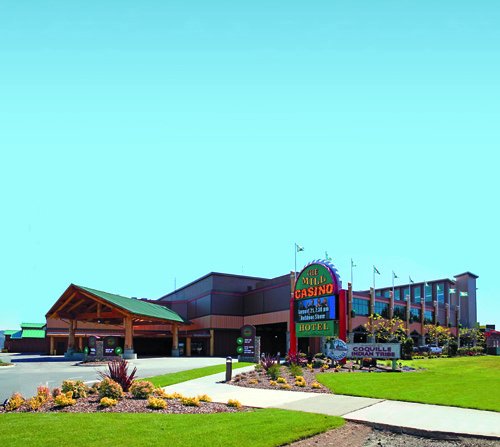 Revenue slightly decreased at some casinos last year and flatlined at others, according to Bob Whelan of ECONorthwest, which analyzes the revenue figures of the state’s nine tribal casinos for a study commissioned by the tribes.
Revenue slightly decreased at some casinos last year and flatlined at others, according to Bob Whelan of ECONorthwest, which analyzes the revenue figures of the state’s nine tribal casinos for a study commissioned by the tribes.
|
Revenue slightly decreased at some casinos last year and flatlined at others, according to Bob Whelan of ECONorthwest, which analyzes the revenue figures of the state’s nine tribal casinos for a study commissioned by the tribes.
Headcounts are up 12.5% even as customers decreased their spending by an average of $10 each at The Mill Casino in Coos Bay, says spokesman Ray Doering. He says revenue for the first quarter of 2009 is flat compared to the first quarter of 2008.
The Mill laid off 33 workers in October but has hired 12 of them back, and has 12 more positions open now. Doering says eliminating staff, cutting back hours and freezing raises for management cut enough costs to offset the loss in revenue due to reduced customer spending. Promotions such as early-bird specials in the restaurant and temporary reduced prices at the hotel have drawn new customers from outside struggling Coos County, where unemployment is 13.7%.
Jeff Dense, an economics professor at Eastern Oregon University who researches gaming, says consumers taking vacations closer to home, along with a smoking ban in bars with video lottery machines, has helped prop up business at tribal casinos. People drive 50 miles to get to a casino instead of walking down the street to a bar? “If they could smoke, they’d travel,” Dense says.
He says lotteries are usually more recession-proof than casinos, but not this year. The state reports lottery revenues are down 9%.
Headcounts and revenues were steady at Spirit Mountain Casino in Grande Ronde in the first quarter of this year, says CEO Rodney Ferguson, but he says customers now spend more on non-gaming activities than gaming. Kah-Nee-Ta, Wildhorse and Chinook Winds casinos say their revenue is flat over last year. The Old Camp, Three Rivers, and Kla-Mo-Ya casinos did not respond to inquiries.
Local economies may have an impact on tribal casinos. Fifty-six jobs were cut in January at Seven Feathers Casino in Douglas County, where unemployment is 16.9%. Wayne Shammel, general counsel for the Cow Creek tribe, says revenue is down more than 15% from last year. He expects more traffic now that the casino hotel has added 155 rooms. But for now, customers are scarce. “There’s no such thing as milk, bread, eggs and a hand of blackjack,” he says.



